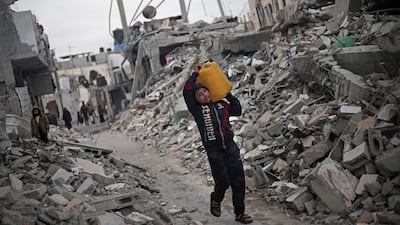Live updates: Follow the latest news on Israel-Gaza
The Palestinian Authority is in discussions with Hamas as it seeks to create a technocratic government that would unify control over Palestinian territories.
The Palestinian ambassador to the UK Husam Zomlot outlined plans for the new government on Tuesday, following the resignation of Prime Minister Mohammad Shtayyeh.
“This is a moment for our people (who are) wounded, destitute, sleeping in open-air spaces,” he said.
“For the unity of our people and the unity of our system,” he added.
President Mahmoud Abbas has been under pressure from the US to reform the Palestinian Authority to effectively govern Gaza after the war ends.
Mr Shtayyeh’s resignation was intended to “pave the way” for these reforms, Mr Zomlot said.
The new government will be formed after elections and will address the humanitarian catastrophe in Gaza, followed by political, economic and security reforms, Mr Zomlot said.
On Monday, officials from the US, Qatar, Egypt and Israel met in Doha to discuss an “understanding” reached in Paris last week to pause the Gaza war and to discuss postwar mechanisms to run the devastated Palestinian territory.
Sources told The National that the priority topic of discussion would be the formation of an interim Palestinian government made up of non-partisan technocrats to run Gaza and the occupied West Bank when a ceasefire is in place.
Such is the scale of the humanitarian crisis in Gaza, that tens of thousands would die even if a ceasefire came into effect immediately, Mr Zomlot said.
Ending the Israeli occupation of the Palestinian territories and seeking a “full commitment to international law” from the global powers will be a priority for the new government. Such a step would allow the right of return and compensation for Palestinian refugees.
It will also call for an international peace conference in which “timetables” and “security arrangements” for a postwar Gaza can be agreed on.
The Palestinian Authority was formed in 1993 as a result of the Oslo Accords. However, its control is limited by the accords and Israeli occupation, damaging its credibility among Palestinians and the international community.
Mr Zomlot called on the international community to push for an “enabling environment” for the new government, in which its powers would not be limited by the Israeli occupation.
The international community must shift from talks of a two-state solution towards the recognition of Palestinian statehood. “There is already a state that exists, that is Israel, occupying another state that also exists, that is the state of Palestine,” Mr Zomlot said.
Latest from the Israel-Gaza war – in pictures
Asked by The National whether Hamas would agree to a technocratic arrangement, Mr Zomlot said it was an “internal matter,” in which Palestinians would decide.
Hamas took control of the enclave by force in 2007, having won elections in 2006 that were rejected by the international community. The West Bank is governed by the Palestinian Authority. Its ruling Fatah party has been at odds with Hamas.
Qatar and Egypt were mediating for Hamas in the construction of this new government, Mr Zomlot confirmed. “There are discussions, but there will be many other issues. This government is a technocratic government. It’s not made of any political factions,” he said.
However, any decisions would be made under the umbrella of the Palestinian Liberation Organisation, which represents all Palestinian groups. “It is a decision that is taken by the State of Palestine, as represented by its legitimate institutions, primarily the PLO,” Mr Zomlot said.
Calling for an “immediate” ceasefire, Mr Zomlot was sceptical of US President Biden’s hopes that this could be achieved by next week. “The Israeli government and Benjamin Netanyahu are very good at playing games, at buying time,” he said.
Israel’s continual bombardment of Gaza suggests they were not ready to stop. “What it looks like on the ground is Israel is relentless in its military campaign. We have no substantial evidence that this is being heeded by Israel,” he added.
“What we want to see is an immediate and permanent ceasefire. Everything rests on that. We cannot have the massive humanitarian and reconstruction programme without access,” he said.





















